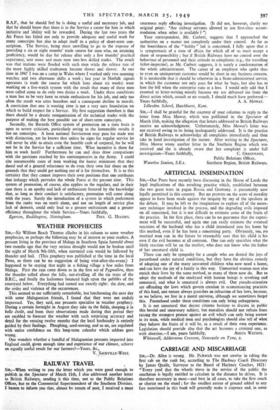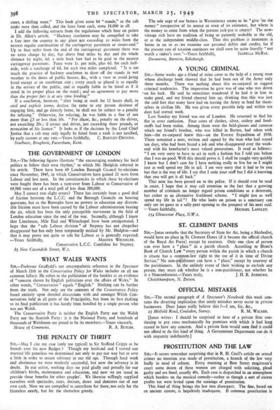CARRIAGE AND MISCARRIAGE
Sta,—Dr. Allen is wrong. Mr. Pickwick was not unwise in taking the first cab on the rank for, according to The Hackney Coach Directory by James Quaife, Surveyor to the Board of Hackney Coaches, 1821: "Every yard that the wheels move in the service of the public the coachman is legally entitled to calculate in the distance he drives. It is therefore necessary in most—and best in all cases, to take the first coach or chariot on the stand ; for the smallest extent of ground added to any fare mentioned in this book will generally make it sixpence and, in some
cases, a shilling more." This book gives some 84 " stands," as the cab ranks were then called, and the fares from each, some 18,000 in all. I add the following extracts from the regulations which bear on points in Dr. Allen's article. " Hackney coachmen may be compelled to take a fare into the country to any place riot exceeding to miles from the nearest regular continuation of the carriageway pavement or stones-end." Up to four miles from the end of the carriageway pavement there was no extra charge by day, but above four miles by day and the whole distance by night, 6d. a mile back fare had to be paid to the nearest carriageway pavement. Fares were ls. per mile, plus 6d. for each half- mile, with a surcharge of 6d. for each two miles completed. " It is too much the practice of hackney coachmen to draw off the stands in wet weather to the doors of public houses, &c., with a view to avoid -heing hired except at an exorbitant rate ; every coach so placed is as equally in the service of the public, and as equally liable IQ be hired as if it stood in its proper place on the stand ; and no agreement to pay more than the proper fare is at any time binding."
If a coachman, however, " after being at work for 12 hours shall, in civil and explicit terms, declare the same to any person desirous of engaging him, and go directly home, he shall not be subject to a penalty for refusing." Otherwise, for refusing, he was liable to a fine of not more than £3 or less than 10s. " For ahuse, &c., penalty on the driver, not exceeding 20s.; if owner and driver, not exceeding three pounds, or revocation of his licence." It looks as if the decision by the Lord Chief Justice that a cab may only legally be hired from a rank is not justified, by early custom at any rate.—Yours faithfully, C. BARTLEY-DENNISS. Scarbutts, Boughton, Faversham, Kent.















































 Previous page
Previous page